How to get around Mauritius?
Mauritius is not a big island, with its approx 2,000 km2 – but it takes time to get around. The small and winding roads were never meant for the traffic they see today – and even though many new roads have been (and are being) build, we are still on a small island and space is often an issue. All the secondary roads go through villages and houses are frequently built all the way up to the street. I say secondary roads, but actually motorways as well: the M1 meets the M2 in the middle of Port Louis, the capital. Obviously transportation and daily life are impacted by this.
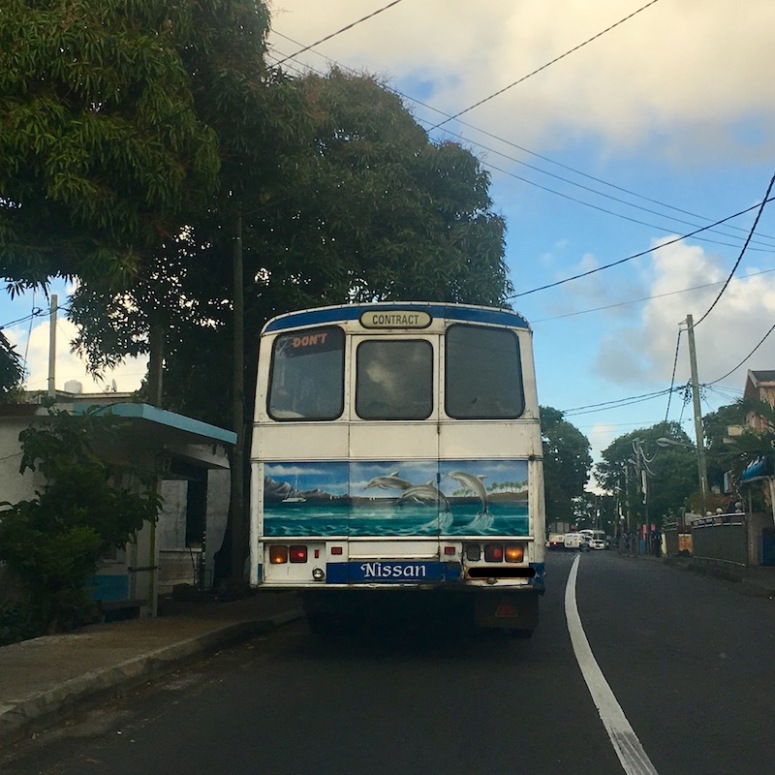
Public transportation
Easy as we only have the bus. The construction of the first metro express line is just starting as I am writing this.
- The bus. I have to admit, it is not something I often do, mostly because I never have to go anywhere locally where I could use the bus. We don’t even have a proper bus stop on our small road – if we were in Belle Mare or the centre of Poste de Flacq for example, it would be easier, but we are a bit out of the way. The bus system is quite vast though and there are many stops (some say 900). A majority of Mauritians use the bus daily, but unfortunately, it is not always very reliable.
However, taking the bus is absolutely possible, it’s quite an experience and there are some easy routes that I can recommend, should you want to try!
– Express buses, like the 215 from Port Louis to Grand Baie for example: it takes 25min and the bus has air conditioning. It is a bit more expensive than the normal bus that stops everywhere and has no A/C. That same route on a non express bus can take well over an hour. 215 is perfect if you stay in Grand Baie and want to check out Port Louis for the day.
– Shorter routes, along the coast from one small city to another, are fine – the buses might be old (most date back to the independence), some drive a bit too fast, others very slow – but the system works. We take it sometimes from my in laws down to Port Louis or when we are in the north to go to the beach.
- How does the bus work in Mauritius?
– The busses run from 5:30am to 8pm approx., with some of them finishing around 6pm and there isn’t really an official schedule: the most popular ones run every 15min, others might have an hour between them – but there are no fancy signs with times and such.
– There are several operators around the island, but it doesn’t really matter when you use the bus as you buy a one-way ticket on board with the controller. Make sure to keep your ticket if an inspector comes by.
– In every larger city there are central bus stations. If you are looking for a bus to go somewhere just ask around, there are usually controllers waiting at the stations, they will direct you and always ask the driver when you board (on the older busses there are not always the bus number or destination). The same goes for the stop, better tell the driver where you plan to get down (or a landmark) as there are no announcement in the bus. Mauritians are known for their kindness, and they will love that tourists take the bus – so don’t hesitate to ask! This website, Mauritius-Buses, looks pretty much up to date, you can see all the routes and plan your trips.
– Prices, depending on where you go obviously, are something around Rs18 to Rs40 (max $1).
One thing I cannot recommend is trying to take the bus from the airport to a hotel somewhere. It will be very complicated with the luggage and it would take literally, hours.
One important question: Is it safe to take the bus in Mauritius?
Let’s be honest about one thing… most of the buses are old and probably would not be deemed fit to transport people in Europe, let alone be on the roads. However, they run here everyday and accidents are very rare.

Private transportation: taxi, vans, rental cars/scooters
When you arrive at the airport you will usually have transport organised by the hotel to pick you up. This is also valid for all excursions you will book through the hotel where you are staying or outside operators (again depending on where you are and the type of hotel you stay at probably count from Rs1000 to Rs2000 / person.
- Taxis – As everywhere around the world, taxi lobbying in Mauritius is serious business. Each hotel / city has an allocated number of taxis – with the name of their allocated pick up spot on the front door. The rule is that a taxi is not allowed to come and pick up at a spot that is not his, unless you happen to flag it down. There are no meters on taxis in Mauritius and if you go one way, the driver should come back empty (unless he breaks the rule of course). For these reasons the taxi drivers decide on a price and it is a bit take it or leave it. On the street you can bargain if you go locally (sometimes you can get half price if you are good). In hotels, there are fix prices which should be available at the concierge desk.
Prices: a pick up from your hotel to the airport would probably be around Rs1800-Rs2200 (USD55-70) depending on where you are. For other rides make sure to discuss the price before entering the vehicle. - Vans. These are usually used by hotels or tour operators to organise pick up at the airport or for larger groups to go on excursions. They have big blue signs on the door stating they are allowed to carry tourists (or school or employees).
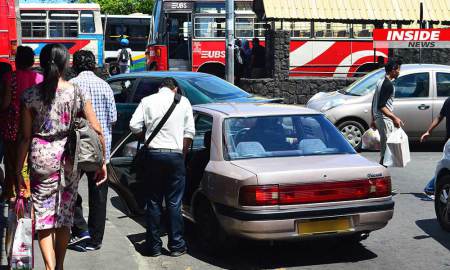
- ‘Taxis marron’, aka illegal taxis, are everywhere on the island and most Mauritians who take the bus use them as well. They charge the same as a bus ride, but stop to pick up and drop off passengers along the road. It is a necessary evil on the island simply because there are not enough buses at peak hour and they also go faster. If you walk along the road you will get honked at ever so often – the ‘taxi marron’ inquiring if you want a lift. They are generally very run down vehicles and more important they are not licensed to carry passengers, thus do not have any insurance. Personally, I have never taken them. Vans are doing the same on longer routes. There are also private people acting as taxis and would approach you on the street in very touristic areas asking if you want a taxi – these though not called taxi marron, are not licensed either.
- Car/scooter rental. It has become easier to rent cars in Mauritius. It is also fairly easy to drive around on the island – when you have a GPS or an App on your phone. We drive on the left hand side (one of the things left from the British!) – though it is not difficult to drive on the island, drivers here tend to not respect certain things (white lines, stop signs, speed limits) and overtake even if clearly they do not have space or have poor visibility. So be very vigilant and you’ll be fine. For the rental car, there is a pick up at the airport with very easy access. It remains quite expensive though, so unless you plan on using the car everyday it might not be very cost efficient. Most hotels/villas can also organise a rental for you – so you can have a car for a few days only. The same point has to be made as with the ‘taxi marron’, you might get an offer of someone who knows someone you can ‘rent’ a car from… probably at a very good price, but you will not have a proper insurance, no matter what they say… And if you are very brave you can always rent a scooter!
– I use 2 apps when going somewhere I am not too familiar with: GoogleMaps and Waze. Just make sure you check the map before going, as well as listening to the sweet lady taking you around, because sometimes she comes out with an itinerary much longer than necessary.
A little recap of transports in Mauritius
- CAN
- Take the bus for all routes if time is not an issue
- Stick to local routes and express routes on the bus system if you don’t want to waste too much time and are travelling during the day
- Take taxis on the street and discuss the price before taking off
- Organise legal pick up/drop offs through the hotel/villa where you are staying
- Rent a car to discover the island freely
- SHOULD NOT (but of course can, if feeling adventurous)
- Take the bus for longer drives, though very cost effective, you will waste a lot of time
- Take a taxi marron or any
- Rent a car from a person who does not have proper authorisation.
Of course… you can always go by the air.
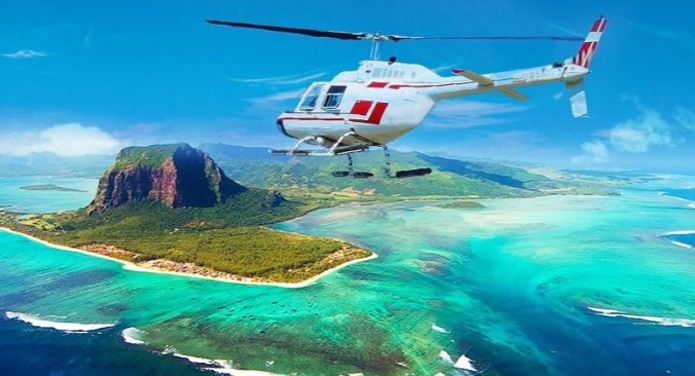
There are helicopters or sea planes rides available – we are on a luxury destination island after all.
– Air Mauritius offers helicopter rides – to and from the airport to certain hotels/areas where they have helipads or just for a trip. Corail Helicopters also fly and we have flown with them in Reunion Island – the service was very good and it was an amazing experience!
– Island Wings offers trips on sea planes.
– Born to Fly offers trips on sea planes.
I have never tried any of these in Mauritius – I had my fair share of sea plane rides when we lived in the Maldives; however I am sure the views are amazing and the experience would be a really special one.
My post about our ride: Discover Reunion Island from the air – a fabulous helicopter ride.
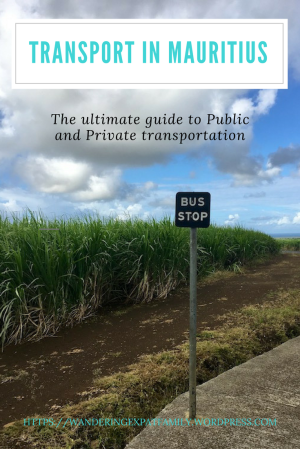
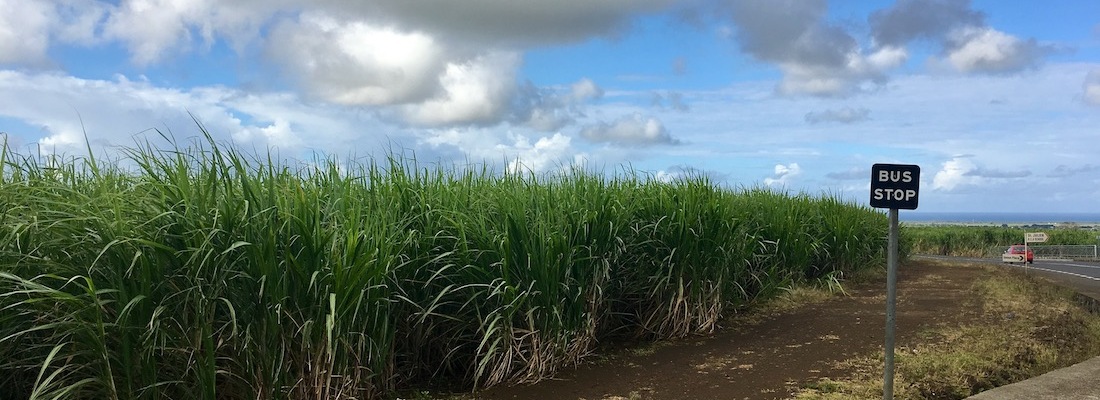
61 thoughts on “Guide to transportation in Mauritius”